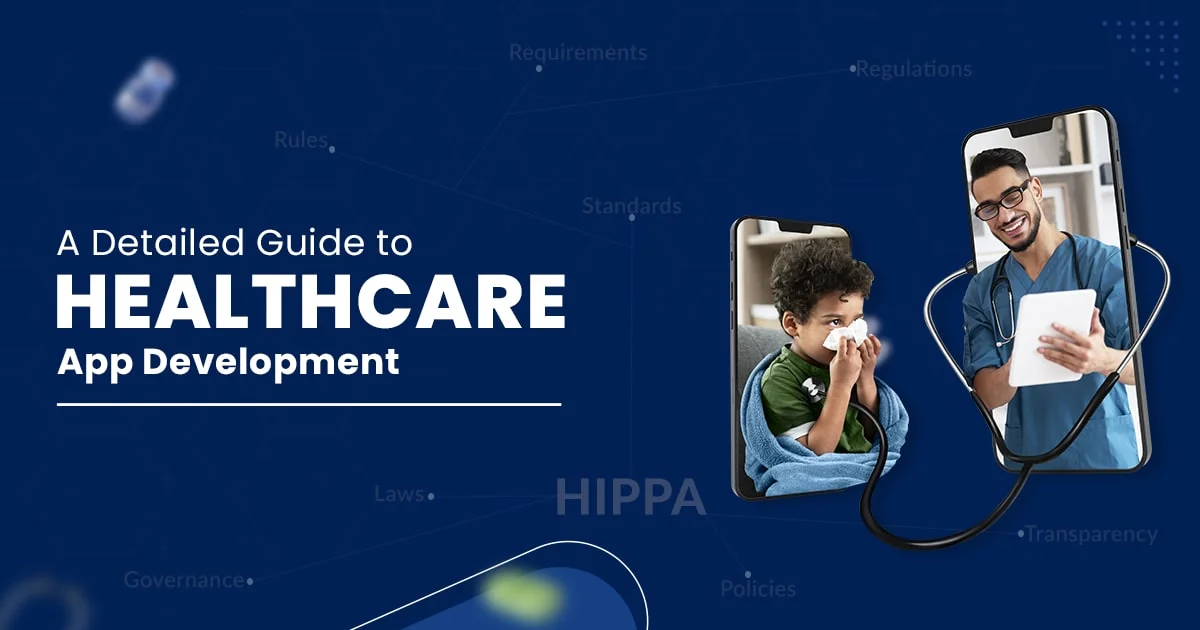The healthcare industry is undergoing a digital transformation, fueled by advancements in mobile technology and a growing demand for convenient, patient-centric care. At the forefront of this change are healthcare mobile apps, offering a wide range of functionalities that improve patient experiences, streamline workflows for providers, and ultimately, revolutionize the delivery of healthcare.
For those who want to develop an innovative mHealth app, a leading custom healthcare app development company can help. But understanding current trends, cost considerations, and best practices is crucial for success. This blog explores the exciting landscape of healthcare app development in 2024, equipping you with the knowledge needed to navigate this dynamic field.
Top Trends Shaping Healthcare App Development
Below are some of the most exciting trends in healthcare app development:
Telemedicine on the Rise
The COVID-19 pandemic accelerated the adoption on how to build a telemedicine app, allowing patients to consult with doctors remotely. This trend continues in 2024, with healthcare mobile apps playing a central role in facilitating virtual consultations, prescription renewals, and remote patient monitoring.
Focus on Preventative Care
The emphasis is shifting towards preventative care, with apps encouraging healthy lifestyles and early disease detection. Features like wearable device integration, symptom checkers, and personalized health trackers empower patients to take a more proactive approach to their health.
AI Integration for Enhanced Diagnosis and Treatment
Artificial intelligence is finding its way into healthcare apps, providing valuable insights for diagnosis and treatment planning. AI algorithms can analyze medical data, predict potential health risks, and even offer personalized medication recommendations.
Mental Health Apps Gain Traction
Addressing the growing need for mental health support, apps offering mindfulness exercises, therapy sessions, and self-management tools are gaining popularity. These apps empower individuals to prioritize their mental well-being and connect with mental health professionals conveniently.
Blockchain for Secure Data Management
Blockchain technology offers a secure and transparent platform for managing healthcare data. As data security remains a top concern, healthcare apps leveraging blockchain can enhance patient trust and ensure the privacy of sensitive medical information.
Understanding the Costs of Healthcare App Development
The typical range for the development cost of a healthcare app is usually between $100,000 and $500,000. It's important to bear in mind that this is a broad estimate, and the actual expenses differ widely depending on the specific category of the healthcare app. Building a healthcare mobile app requires careful planning and budgeting. The cost can vary significantly depending on several factors, including:
- App Complexity: Basic apps with limited features will be less expensive than complex platforms with advanced functionalities like telemedicine or AI integration.
- Platform Development: Developing for both iOS and Android platforms will incur additional costs compared to a single platform launch.
- Development Team Expertise: The experience and skillset of your development team will impact the overall cost.
- Compliance Requirements: Healthcare apps must comply with strict regulations like HIPAA. Building in compliance features will add to the development cost.
Best Practices for Building a Successful Healthcare App (Beyond the Basics)
While the core best practices like user focus, HIPAA compliance, and robust security remain essential, building a successful healthcare app in 2024 requires going beyond the basics. Here are some additional best practices to consider:
1. Embrace Gamification for Engagement:
People are wired to respond to rewards and challenges. Gamification techniques like points, badges, and leaderboards can be incorporated to encourage healthy habits, medication adherence, and completion of preventive care tasks. This approach can make using your app more engaging and enjoyable for users, leading to sustained use and improved health outcomes.
2. Prioritize Inclusivity and Accessibility:
Healthcare needs to be accessible to everyone. When designing your app, prioritize inclusivity by ensuring compatibility with assistive technologies and catering to users with disabilities. Offer features like text-to-speech functionality, larger font options, and color contrast adjustments to create a user-friendly experience for all.
3. Leverage Wearable Device Integration:
Wearable devices are becoming increasingly popular, generating a wealth of health data. Integrate your app with popular wearables to allow users to track vital signs, monitor sleep patterns, and manage fitness goals directly within the app. This seamless data collection empowers users with a more comprehensive picture of their health.
4. Foster a Culture of Data Privacy:
Transparency and user control over data are paramount. Clearly communicate your data collection practices and how user information is used. Allow users to easily access, modify, and delete their data whenever they choose. Building trust around data privacy is essential for user adoption and maintaining a positive reputation.
5. Partner with Healthcare Organizations:
Collaborate with hospitals, clinics, and healthcare providers to ensure your app aligns with existing workflows and integrates seamlessly with their systems. This not only improves data exchange but also fosters wider adoption within the healthcare ecosystem.
6. Implement Continuous Feedback Loops:
Building a successful app is an iterative process. Gather user feedback through surveys, in-app reviews, and A/B testing to identify areas for improvement and optimize features based on user needs. Continuously refine your app to ensure it remains relevant and valuable in the ever-evolving healthcare landscape.
The Road Ahead for Healthcare App Development
The future of healthcare app development is brimming with potential. As technology continues to evolve, we can expect even more sophisticated features that personalize patient care, improve diagnostic accuracy, and streamline healthcare delivery.
By staying abreast of emerging trends, adhering to best practices, and prioritizing user needs, custom healthcare app development companies can play a vital role in shaping a more accessible, efficient, and patient-centered healthcare ecosystem for the future.
Ready to embark on your healthcare app development journey? Consider partnering with a reputable and experienced mobile app development company that can guide you through the process, ensuring your app meets regulatory requirements, delivers a seamless user experience, and ultimately contributes positively to the healthcare landscape.





Comments